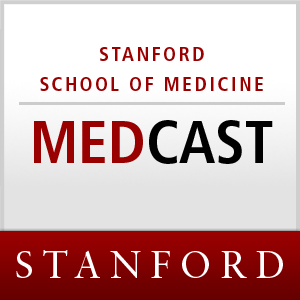Discover Medcast
Medcast

53 Episodes
Reverse
Rachel Manber, PhD, associate professor of psychiatry, explains how biology and psychology interact to regulate sleep and discusses what we can learn from this interaction to get a better night's rest. (December 4, 2008)
Rachel Manber, PhD, associate professor of psychiatry, explains how biology and psychology interact to regulate sleep and discusses what we can learn from this interaction to get a better night's rest. (December 4, 2008)
More than 20 years ago, Alfredo Quinones-Hinojosa, MD, crossed the US-Mexico border with no money and very little English to find work as a migrant farmworker in the fields of California. (November 13, 2008)
More than 20 years ago, Alfredo Quinones-Hinojosa, MD, crossed the US-Mexico border with no money and very little English to find work as a migrant farmworker in the fields of California. (November 13, 2008)
Sexuality is an important survivorship concern for women who have been treated for breast or gynecological cancer. Yet it is largely overlooked by their healthcare providers, says Leah Millheiser, MD. (April 2, 2008)
Sexuality is an important survivorship concern for women who have been treated for breast or gynecological cancer. Yet it is largely overlooked by their healthcare providers, says Leah Millheiser, MD. (April 2, 2008)
Buried beneath today’s ever-growing mountain of genomic, proteomic and clinical data are hidden insights into the genetic and molecular underpinnings of disease, says Atul Butte, MD, PhD. (August 20, 2008)
Buried beneath today’s ever-growing mountain of genomic, proteomic and clinical data are hidden insights into the genetic and molecular underpinnings of disease, says Atul Butte, MD, PhD, assistant professor of medicine and pediatrics. (August 20, 2008)
Diabetes management has been long guided by the glucose hypothesis, which argues that a reduction in blood sugar to normal levels can prevent or delay the onset of diabetes-related complications. (July 30, 2008)
Diabetes management has been long guided by the glucose hypothesis, which argues that a reduction in blood sugar to normal levels can prevent or delay the onset of diabetes-related complications. (July 30, 2008)
More than 500,000 infants and children worldwide die each year from severe diarrhea caused by a rotavirus infection. Harry Greenberg, MD, co-director of the Stanford-LPCH Vaccine Program, discusses the epidemiology of this virus. (July 9, 2008)
More than 500,000 infants and children worldwide die each year from severe diarrhea caused by a rotavirus infection. Harry Greenberg, MD, co-director of the Stanford-LPCH Vaccine Program, discusses the epidemiology of this virus. (July 9, 2008)
Wes Alles, PhD, director of the Stanford Health Improvement Program, discusses the health consequences of Type-A behavior. Alles explores a number of strategies for how Type-A behavior can be modified. (May 29, 2008)
Wes Alles, PhD, director of the Stanford Health Improvement Program, discusses the health consequences of Type-A behavior. Alles explores a number of strategies for how Type-A behavior can be modified. (May 29, 2008)
Carrie Armel, PhD, looks at how climate change and many public health issues, such as obesity, find common cause in transportation and eating habits in the US and elsewhere and other human activities. (May 29, 2008)
Carrie Armel, PhD, looks at how climate change and many public health issues, such as obesity, find common cause in transportation and eating habits in the US and elsewhere and other human activities. (May 29, 2008)
Renee Reijo Pera, PhD, the director of human embryonic stem cell research and education for the Stanford Institute for Stem Cell Biology and Regenerative Medicine, discusses current research with embryonic stem cells. (May 8, 2008)
Renee Reijo Pera, PhD, the director of human embryonic stem cell research and education for the Stanford Institute for Stem Cell Biology and Regenerative Medicine, discusses current research with embryonic stem cells. (May 8, 2008)
Medical science has changed a lot in the past 90 years. Medical education, until relatively recently, has not. (April 3, 2008)
Medical science has changed a lot in the past 90 years. Medical education, until relatively recently, has not. (April 3, 2008)





